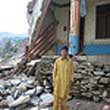Pakistan’s flooding: A tragedy of failed humanity

As the Pakistani people face up to the effects of terrible flooding, Yash Tandon expresses solidarity and stresses that if nature is cruel, a civilisation which puts ‘profits before humanity, and military security before food security’ is surely crueller.
This surely is the time for solidarity. This surely cannot be an occasion to moan and complain about the past. Pakistan is in the middle of its worst flood disaster ever. The sheer scale of it is mind-boggling. An area the size of England is under the surging Indus River and the monsoon rains. 14 million people, probably more – and increasing – are directly affected, while 72 million are in dire need of food, clean water and shelter. Thousands of villages have perished and hundreds of roads and bridges have been destroyed. This is not even the end of the calamity. Our hearts go out to the suffering survivors, their families destroyed, their livelihoods ruined. Whatever assistance is given to them would remain minuscule compared to the magnitude of what is needed now when people are dying every hour, and later when time comes for rehabilitation and reconstruction of the lives of those who must somehow live on.
And yet it is also times like this that one must question whether the human element made the natural disaster worse. Monsoons are a regular phenomenon in the region this time of the year. Admittedly the ferocity of this year’s monsoon was unpredictable. Global warming and climate change must take some of the blame. But this would not absolve human agencies from responsibility for the sheer magnitude of what is undoubtedly a catastrophe. It would have been bad, but need it have been catastrophic?
It is times like this that it is necessary to critically reassess the priorities of political leadership in Pakistan and its allies. Nobody minimises the complexity of the war in Afghanistan. But the whole war has been fraught from beginning to now. The militarisation of the war belittles any claim the contestants make that they are trying for a political solution. Their actions belie their words. Billions of dollars are spent in fighting the redoubtable Taliban in a war that looks increasingly hopeless. A mere fraction of this gargantuan military expenditure could have built ramparts and barrages and canals to contain surging rivers of Pakistan within their shores, or at least not far from the shores.
Our civilisation has got its values upside down – profits before humanity, and military security before food security.
The Pakistan tragedy, like the Haiti tragedy early this year, has brought to the fore another disturbing aspect of our civilisation. Why is it that only the poor should be the ones to suffer the most from natural calamities? Nature has its own mysteriously demonic power, but its effects appear, in our times, to have a recognisable class character. That Pakistani President Zardari should have gone to Europe in the middle of the calamity is not just a cruel joke. It is also symptomatic of the class aspect of natural disasters. As in the case of the earthquake that struck Haiti early this year, it is always the poor who take the brunt of nature’s wrath. Are natural disasters so class-conscious that they kill the poor and spare the rich?
Surely something is terribly wrong in the way human society organises itself. Surely there must be another way of organising our social and political lives, such that natural disasters are either contained or their effects are equitably shared by those who chance upon them. There is cruelty in nature, but there is inexcusable cruelty in the propensity of the upper classes to deceive and swindle the under classes.
Solidarity may help only a few thousand in Pakistan, and indeed it must not be scorned for that reason. But the ghosts of the multitude who have perished and will perish in days, months and years to come will no doubt haunt the living that have chalets in France, places from which to proclaim non-responsibility for this tragedy that has caught a nation so helpless and so unprepared through the sheer recklessness of its political leadership.
BROUGHT TO YOU BY PAMBAZUKA NEWS
* Yash Tandon is the author of ‘Ending Aid Dependence’ and ‘Development and Globalisation: Daring to Think Differently’.
* Please send comments to [email protected] or comment online at Pambazuka News.
